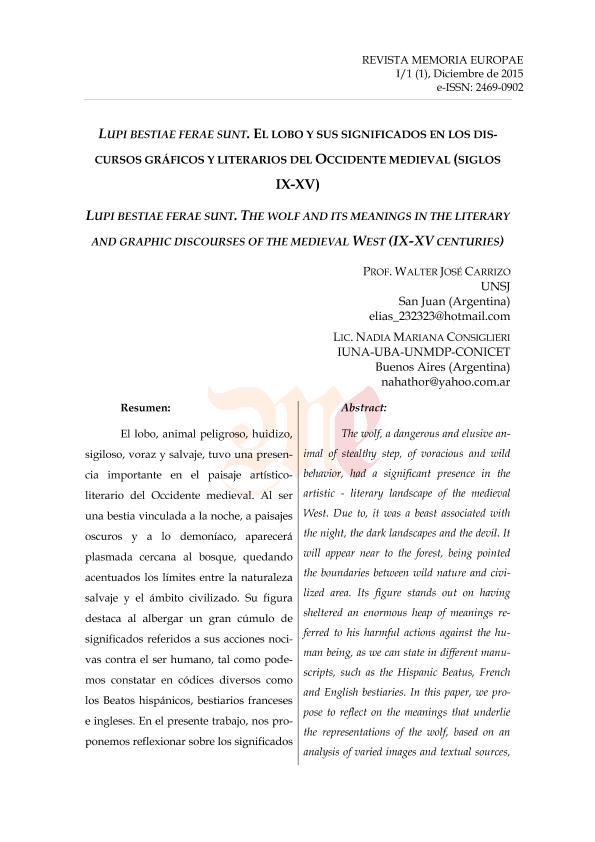Mostrar el registro sencillo del ítem
dc.contributor.author
Carrizo, Walter José

dc.contributor.author
Consiglieri, Nadia Mariana

dc.date.available
2018-10-16T15:08:13Z
dc.date.issued
2015-12
dc.identifier.citation
Carrizo, Walter José; Consiglieri, Nadia Mariana; Lupi bestiae ferae sunt : el lobo y sus significados en los discursos gráficos y literarios del occidente medieval (siglos IX-XV); Universidad Nacional de San Juan. Facultad de Filosofía, Humanidades y Artes. Departamento de Historia. Gabinete de Historia Universal; Memoria Europae; 1; 1; 12-2015; 155-195
dc.identifier.uri
http://hdl.handle.net/11336/62404
dc.description.abstract
El lobo, animal peligroso, huidizo, sigiloso, voraz y salvaje, tuvo una presencia importante en el paisaje artísticoliterario del Occidente medieval. Al ser una bestia vinculada a la noche, a paisajes oscuros y a lo demoníaco, aparecerá plasmada cercana al bosque, quedando acentuados los límites entre la naturaleza salvaje y el ámbito civilizado. Su figura destaca al albergar un gran cúmulo de significados referidos a sus acciones nocivas contra el ser humano, tal como podemos constatar en códices diversos como los Beatos hispánicos, bestiarios franceses e ingleses. En el presente trabajo, nos proponemos reflexionar sobre los significados que subyacen a las representaciones del lobo, a partir del análisis de un abanico variado de imágenes y fuentes textuales, con el fin de desentrañar simbolismos específicos anclados en las cosmovisiones de los siglos IX a XV.
dc.description.abstract
The wolf, a dangerous and elusive animal of stealthy step, of voracious and wild behavior, had a significant presence in the artistic - literary landscape of the medieval West. Due to, it was a beast associated with the night, the dark landscapes and the devil. It will appear near to the forest, being pointed the boundaries between wild nature and civilized area. Its figure stands out on having sheltered an enormous heap of meanings referred to his harmful actions against the human being, as we can state in different manuscripts, such as the Hispanic Beatus, French and English bestiaries. In this paper, we propose to reflect on the meanings that underlie the representations of the wolf, based on an analysis of varied images and textual sources, in order to unravel specific symbolisms rooted in the world view between the IXth and the XVth centuries.
dc.format
application/pdf
dc.language.iso
spa
dc.publisher
Universidad Nacional de San Juan. Facultad de Filosofía, Humanidades y Artes. Departamento de Historia. Gabinete de Historia Universal
dc.rights
info:eu-repo/semantics/openAccess
dc.rights.uri
https://creativecommons.org/licenses/by-nc-sa/2.5/ar/
dc.subject
Lobo
dc.subject
Codices Medievales
dc.subject
Nocividad
dc.subject
Animales
dc.subject.classification
Historia

dc.subject.classification
Historia y Arqueología

dc.subject.classification
HUMANIDADES

dc.title
Lupi bestiae ferae sunt : el lobo y sus significados en los discursos gráficos y literarios del occidente medieval (siglos IX-XV)
dc.title
Lupi bestiae ferae sunt : the wolf and its meanings in the literary and graphic discourses of the medieval west (IX-XV centuries)
dc.type
info:eu-repo/semantics/article
dc.type
info:ar-repo/semantics/artículo
dc.type
info:eu-repo/semantics/publishedVersion
dc.date.updated
2018-10-09T19:35:05Z
dc.identifier.eissn
2469-0902
dc.journal.volume
1
dc.journal.number
1
dc.journal.pagination
155-195
dc.journal.pais
Argentina

dc.journal.ciudad
San Juan
dc.description.fil
Fil: Carrizo, Walter José. Universidad Nacional de San Juan; Argentina. Consejo Nacional de Investigaciones Científicas y Técnicas; Argentina
dc.description.fil
Fil: Consiglieri, Nadia Mariana. Universidad de Buenos Aires; Argentina. Universidad Nacional de Mar del Plata; Argentina. Universidad Nacional de las Artes; Argentina. Consejo Nacional de Investigaciones Científicas y Técnicas; Argentina
dc.journal.title
Memoria Europae
dc.relation.alternativeid
info:eu-repo/semantics/altIdentifier/url/http://www.ojs.unsj.edu.ar/index.php/memoriaeuropae/article/view/63
Archivos asociados
